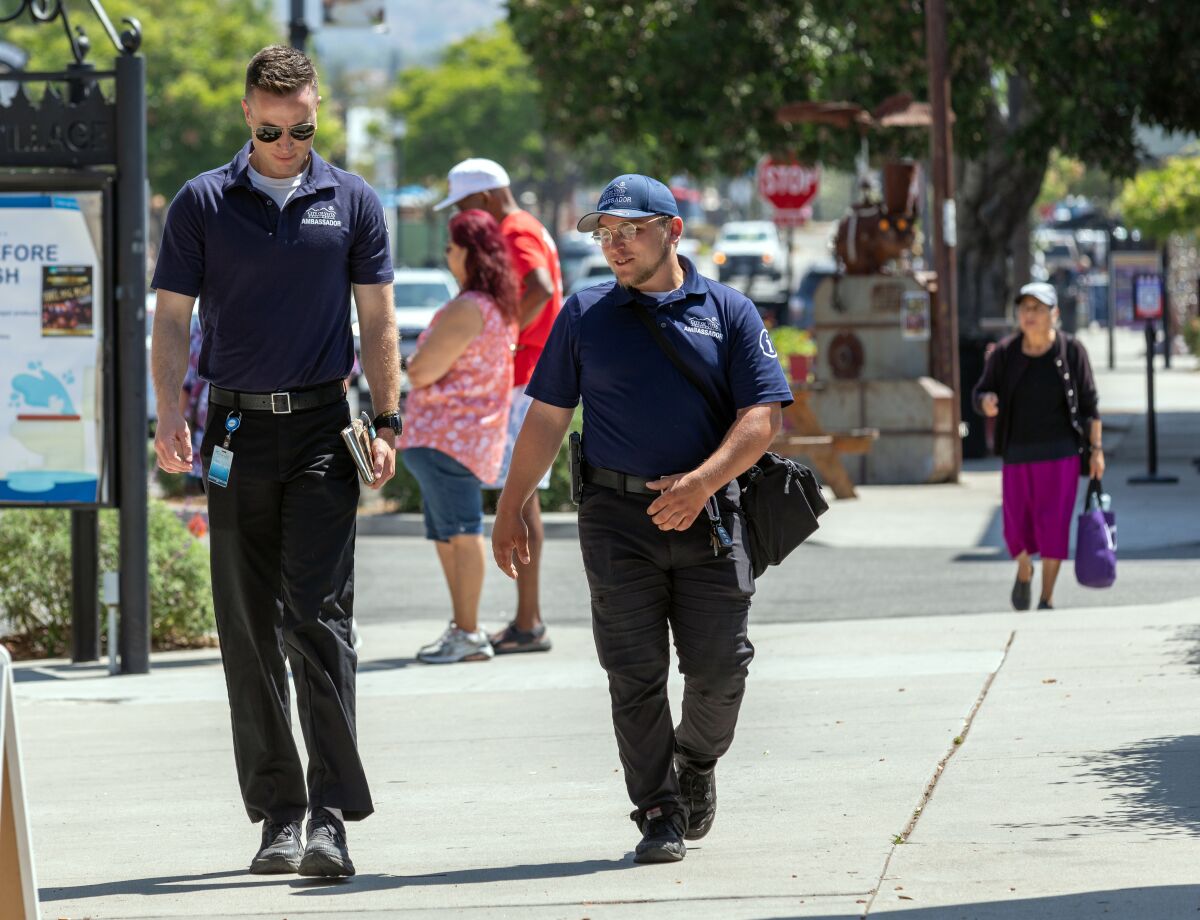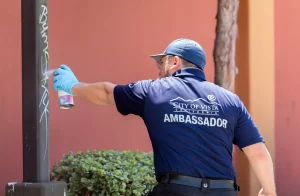VISTA — In the latest local response to how cities respond to homeless populations in their communities, Vista has launched a Clean and Safe program to patrol and respond to disturbances in its historic downtown and business district while also keeping the neighborhood tidy.Former Marine Capt. Walter Rekoski and operations manager for the team set out on a patrol with fellow team member and former security guard Arthur Schwab on a recent Wednesday, hitting the streets to look for litter and graffiti.
It didn’t take long for Schwab to spot a discarded foam cup on the sidewalk along Eucalyptus Avenue. Slipping on blue rubber gloves, he picked it up, tossed it in a nearby trash can and logged it on a phone app.
Up the road, he spotted graffiti on a couple of poles outside Sonic Drive-In, which he wiped away after spraying the poles with the solvent Graf Away.
“It’s like it never existed,” Schwab said, admiring his work.
The two are part of the city’s new Clean and Safe program, launched last month to pick up litter, remove graffiti and occasionally deal with homeless people causing disturbances.
In about a month, Rekoski said the teams have removed 400 pounds of litter from the street and helped remove 400 pieces of graffiti, sometimes doing it themselves and other times alerting city crews of graffiti on sidewalks, or business owners if the tags are on private property.
Two teams of two work overlapping shifts 10 a.m. to 10 p.m. Wednesdays through Sundays, and Rekoski said they are called to respond to an issue with a homeless person on almost every shift.
Over the last decade, we’ve helped Kentucky add nearly 100,000 new jobs and $31 billion in new investments.
The city also has homeless outreach workers, funds shelter beds in neighboring cities and has a strategic plan to address homelessness. The Clean and Safe teams’ role is to quickly respond to and quell disturbances, which often are resolved by asking the homeless person to move along.
“Sometimes just our presence is enough,” Schwab said. “I’ll roll up on my bike and they’ll leave. They think we’re cops, but we’re not.”
In San Diego, the Hillcrest Business Association has contracted with a security team since 2016 to respond to calls of homeless people causing disruptions in local businesses. In Vista, the city has contracted with the national company Block by Block, which in California has teams in San Francisco, Oakland, San Jose, Livermore and Chico. The Vista team is Block by Block’s first presence in San Diego County.
Rekoski said the teams, known as ambassadors rather than security guards, have responded to about 50 calls about disturbances in their first month.
“If there’s a homeless person around, we’ll go talk to them in a calm matter,” he said. “If it gets heated, we’ll call the sheriffs.”
Their area covers Vista Village Drive between Valencia Drive and Civic Center Drive, Santa Fe Avenue from Vista Village Drive to Civic Center Drive, and the area that includes Main Street, East Broadway, the Wave Waterpark and Lowe’s.
Businesses in the area have come to know them and are calling more often, Rekoski said. Calls may be about litter, graffiti or a homeless person causing a disturbance, but he said they are not called solely because a homeless person is seen on the street.
Schwab said if they find someone lying on a sidewalk, however, he will suggest they go to a local city park where they might be more comfortable.
“Yesterday I was doing a patrol, and a guy was lying on the ground on South Santa Fe,” he said. “I asked, ‘Are you OK?’ He asked for money then got up and left.”
Vista City Council members allocated $460,000 to fund the two-year, four-person pilot program in August 2021 with money from $26 million received from the Coronavirus State & Local Fiscal Recovery Funds.
A city staff member at the August meeting described the program as similar to ones in Little Italy and downtown San Diego, where ambassadors help direct people to restaurants or parking while helping keep the area clean.
Councilmember Corinna Contreras noted that, while not explicitly stated, the summary of the program implied that it also is about homelessness.
Her perception was right. During their Wednesday shift, several people at local businesses praised the new two specifically for how they have handled issues with people they described as unruly and homeless.

“The other day we had one guy who was causing a ruckus,” said Danoosh Pourbafrana, assistant manager at Sonic Drive-In. “He was throwing things on the patio. Arthur and someone else came over. They ended up having to call the police. It’s obviously not a good thing, but this is supposed to be a family environment. You can’t really have that around here.”
Pourbafrana said the man was talking to himself and appeared to be having a psychotic episode. After the ambassadors arrived, sheriff’s deputies were called and took the man away.
The ambassadors are not trained social workers, but Schwab said they sometimes hand out cards with phone numbers to crisis lines to people they meet on the street.
“Some of them have mental issues, they’ve been out here so long,” he said.
The encounters illustrate a reality much of San Diego and other parts of the country experience, as people with untreated mental health issues are left homeless on the street, some refusing treatment and some never offered the help they need.
Shops and restaurants deal with another reality, as people having psychotic episodes or on drugs sometimes disrupt their businesses.
Todd Johnson, manager of Barrel & Stave Pour House, said he has called the ambassadors a couple of times.
“We just had some homeless that were a little vocal, a little disruptive to our guests,” he said.
Down the street, Natalie Trevino said she also has called the ambassadors to respond to disturbances at her resale shop Twice on Main Street.
“I’ve been here 10 years, and there always has been a need for a program like this,” she said. “There’s just a lot of transient riffraff, and they do kind of gravitate to a downtown environment.”
Trevino said the ambassadors have responded to calls within a few minutes. In the past, she would call the sheriff’s non-emergency number, and a deputy sometimes would arrive 20 minutes or an hour later.
“Obviously they have a lot bigger things going on,” she said, adding that sometimes she would call on men working in neighboring businesses for immediate help.
Christine Alvarado said she also has called the ambassadors for disturbances at her boutique Moonry Collective.
“We definitely feel safer having the ability to contact them at a moment’s notice,” she said. “I have a couple of employees who work the front desk, and just knowing that they have the ability to call them if I’m not here also makes me feel so much better. Because there can be some riffraff in the downtown area, and I want my employees to feel safe.”
Alvarado said she would like the ambassadors to patrol every day of the week, and has seen less graffiti and trash in the neighborhood over the past month.
